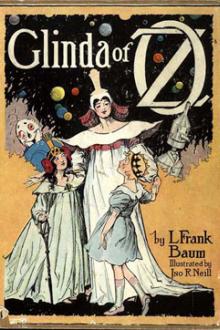The Patchwork Girl of Oz, L. Frank Baum [novels for students .txt] 📗

- Author: L. Frank Baum
Book online «The Patchwork Girl of Oz, L. Frank Baum [novels for students .txt] 📗». Author L. Frank Baum
"I wonder if this is my breakfast?"
"Eat it!" commanded a Voice at his side, so near that Ojo jumped. But no person could he see.
He was hungry, and the breakfast looked good; so he sat down and ate all he wanted. Then, rising, he took his hat and wakened the Glass Cat.
"Come on, Bungle," said he; "we must go."
He cast another glance about the room and, speaking to the air, he said: "Whoever lives here has been kind to me, and I'm much obliged."
There was no answer, so he took his basket and went out the door, the cat following him. In the middle of the path sat the Patchwork Girl, playing with pebbles she had picked up.
"Oh, there you are!" she exclaimed cheerfully. "I thought you were never coming out. It has been daylight a long time."
"What did you do all night?" asked the boy.
"Sat here and watched the stars and the moon," she replied. "They're interesting. I never saw them before, you know."
"Of course not," said Ojo.
"You were crazy to act so badly and get thrown outdoors," remarked Bungle, as they renewed their journey.
"That's all right," said Scraps. "If I hadn't been thrown out I wouldn't have seen the stars, nor the big gray wolf."
"What wolf?" inquired Ojo.
"The one that came to the door of the house three times during the night."
"I don't see why that should be," said the boy, thoughtfully; "there was plenty to eat in that house, for I had a fine breakfast, and I slept in a nice bed."
"Don't you feel tired?" asked the Patchwork Girl, noticing that the boy yawned.
"Why, yes; I'm as tired as I was last night; and yet I slept very well."
"And aren't you hungry?"
"It's strange," replied Ojo. "I had a good breakfast, and yet I think I'll now eat some of my crackers and cheese."
Scraps danced up and down the path. Then she sang:
"Kizzle-kazzle-kore;
The wolf is at the door,
There's nothing to eat but a bone without meat,
And a bill from the grocery store."
"What does that mean?" asked Ojo.
"Don't ask me," replied Scraps. "I say what comes into my head, but of course I know nothing of a grocery store or bones without meat or—very much else."
"No," said the cat; "she's stark, staring, raving crazy, and her brains can't be pink, for they don't work properly."
"Bother the brains!" cried Scraps. "Who cares for 'em, anyhow? Have you noticed how beautiful my patches are in this sunlight?"
Just then they heard a sound as of footsteps pattering along the path behind them and all three turned to see what was coming. To their astonishment they beheld a small round table running as fast as its four spindle legs could carry it, and to the top was screwed fast a phonograph with a big gold horn.
"Hold on!" shouted the phonograph. "Wait for me!"
"Goodness me; it's that music thing which the Crooked Magician scattered the Powder of Life over," said Ojo.
"So it is," returned Bungle, in a grumpy tone of voice; and then, as the phonograph overtook them, the Glass Cat added sternly: "What are you doing here, anyhow?"
"I've run away," said the music thing. "After you left, old Dr. Pipt and I had a dreadful quarrel and he threatened to smash me to pieces if I didn't keep quiet. Of course I wouldn't do that, because a talking-machine is supposed to talk and make a noise—and sometimes music. So I slipped out of the house while the Magician was stirring his four kettles and I've been running after you all night. Now that I've found such pleasant company, I can talk and play tunes all I want to."
Ojo was greatly annoyed by this unwelcome addition to their party. At first he did not know what to say to the newcomer, but a little thought decided him not to make friends.
"We are traveling on important business," he declared, "and you'll excuse me if I say we can't be bothered."
"How very impolite!" exclaimed the phonograph.
"I'm sorry; but it's true," said the boy. "You'll have to go somewhere else."
"This is very unkind treatment, I must say," whined the phonograph, in an injured tone. "Everyone seems to hate me, and yet I was intended to amuse people."
"It isn't you we hate, especially," observed the Glass Cat; "it's your dreadful music. When I lived in the same room with you I was much annoyed by your squeaky horn. It growls and grumbles and clicks and scratches so it spoils the music, and your machinery rumbles so that the racket drowns every tune you attempt."
"That isn't my fault; it's the fault of my records. I must admit that I haven't a clear record," answered the machine.
"Just the same, you'll have to go away," said Ojo.
"Wait a minute," cried Scraps. "This music thing interests me. I remember to have heard music when I first came to life, and I would like to hear it again. What is your name, my poor abused phonograph?"
"Victor Columbia Edison," it answered.
"Well, I shall call you 'Vic' for short," said the Patchwork Girl. "Go ahead and play something."
"It'll drive you crazy," warned the cat.
"I'm crazy now, according to your statement. Loosen up and reel out the music, Vic."
"The only record I have with me," explained the phonograph, "is one the Magician attached just before we had our quarrel. It's a highly classical composition."
"A what?" inquired Scraps.
"It is classical music, and is considered the best and most puzzling ever manufactured. You're supposed to like it, whether you do or not, and if you don't, the proper thing is to look as if you did. Understand?"
"Not in the least," said Scraps.
"Then, listen!"
At once the machine began to play and in a few minutes Ojo put his hands to his ears to shut out the sounds and the cat snarled and Scraps began to laugh.
"Cut it out, Vic," she said. "That's enough."
But the phonograph continued playing the dreary tune, so Ojo seized the crank, jerked it free and threw it into the road. However, the moment the crank struck the ground it bounded back to the machine again and began winding it up. And still the music played.
"Let's run!" cried Scraps, and they all started and ran down the path as fast as they could go. But the phonograph was right behind them and could run and play at the same time. It called out, reproachfully:
"What's the matter? Don't you love classical music?"
"No, Vic," said Scraps, halting. "We will passical the classical and preserve what joy we have left. I haven't any nerves, thank goodness, but your music makes my cotton shrink."
"Then turn over my record. There's a rag-time tune on the other side," said the machine.
"What's rag-time?"
"The opposite of classical."
"All right," said Scraps, and turned over the record.
The phonograph now began to play a jerky jumble of sounds which proved so bewildering that after a moment Scraps stuffed her patchwork apron into the gold horn and cried: "Stop—stop! That's the other extreme. It's extremely bad!"
Muffled as it was, the phonograph played on.
"If you don't shut off that music I'll smash your record," threatened Ojo.
The music stopped, at that, and the machine turned its horn from one to another and said with great indignation: "What's the matter now? Is it possible you can't appreciate rag-time?"
"Scraps ought to, being rags herself," said the cat; "but I simply can't stand it; it makes my whiskers curl."
"It is, indeed, dreadful!" exclaimed Ojo, with a shudder.
"It's enough to drive a crazy lady mad," murmured the Patchwork Girl. "I'll tell you what, Vic," she added as she smoothed out her apron and put it on again, "for some reason or other you've missed your guess. You're not a concert; you're a nuisance."
"Music hath charms to soothe the savage breast," asserted the phonograph sadly.
"Then we're not savages. I advise you to go home and beg the Magician's pardon."
"Never! He'd smash me."
"That's what we shall do, if you stay here," Ojo declared.
"Run along, Vic, and bother some one else," advised Scraps. "Find some one who is real wicked, and stay with him till he repents. In that way you can do some good in the world."
The music thing turned silently away and trotted down a side path, toward a distant Munchkin village.
"Is that the way we go?" asked Bungle anxiously.
"No," said Ojo; "I think we shall keep straight ahead, for this path is the widest and best. When we come to some house we will inquire the way to the Emerald City."
Chapter Eight The Foolish Owl and the Wise Donkey
On they went, and half an hour's steady walking brought them to a house somewhat better than the two they had already passed. It stood close to the roadside and over the door was a sign that read: "Miss Foolish Owl and Mr. Wise Donkey: Public Advisers."
When Ojo read this sign aloud Scraps said laughingly: "Well, here is a place to get all the advice we want, maybe more than we need. Let's go in."
The boy knocked at the door.
"Come in!" called a deep bass voice.
So they opened the door and entered the house, where a little light-brown donkey, dressed in a blue apron and a blue cap, was engaged in dusting the furniture with a blue cloth. On a shelf over the window sat a great blue owl with a blue sunbonnet on her head, blinking her big round eyes at the visitors.
"Good morning," said the donkey, in his deep voice, which seemed bigger than he was. "Did you come to us for advice?"
"Why, we came, anyhow," replied Scraps, "and now we are here we may as well have some advice. It's free, isn't it?"
"Certainly," said the donkey. "Advice doesn't cost anything—unless you follow it. Permit me to say, by the way, that you are the queerest lot of travelers that ever came to my shop. Judging you merely by appearances, I think you'd better talk to the Foolish Owl yonder."
They turned to look at the bird, which fluttered its wings and stared back at them with its big eyes.
"Hoot-ti-toot-ti-toot!" cried the owl.
"Fiddle-cum-foo,
Howdy-do?
Riddle-cum, tiddle-cum,
Too-ra-la-loo!"
"That beats your poetry, Scraps," said Ojo.
"It's just nonsense!" declared the Glass Cat.
"But it's good advice for the foolish," said the donkey, admiringly. "Listen to my partner, and you can't go wrong."
Said the owl in a grumbling voice:
"Patchwork Girl has come to life;
No one's sweetheart, no one's wife;
Lacking sense and loving fun,
She'll be snubbed by everyone."
"Quite a compliment! Quite a compliment, I declare," exclaimed the donkey, turning to look at Scraps. "You are certainly a wonder, my dear, and I fancy you'd make a splendid pincushion. If you belonged to me, I'd wear smoked glasses when I looked at you."
"Why?" asked the Patchwork Girl.
"Because you are so gay and gaudy."
"It is my beauty that dazzles you," she asserted. "You Munchkin people all strut around in your stupid blue color, while I—"
"You are wrong in calling me a Munchkin," interrupted the donkey, "for I was born in the Land of Mo and came to visit the Land of Oz on the day it was shut off from all the rest of the world. So here I am obliged to stay, and I confess it is a very pleasant country to live in."
"Hoot-ti-toot!" cried the owl;
"Ojo's searching for a charm,
'Cause Unc Nunkie's come to harm.
Charms are scarce; they're hard to get;
Ojo's got a job, you bet!"
"Is the owl so very foolish?" asked the boy.
"Extremely so," replied the donkey. "Notice what vulgar expressions she uses. But I admire the owl for the reason that she is positively foolish. Owls are supposed to be so very wise, generally, that a foolish one is unusual, and you perhaps know that anything or anyone unusual is sure to be interesting to the wise."
The owl flapped its wings again, muttering these words:
"It's hard to be a glassy cat—
No cat can be more hard than that;
She's so transparent, every act
Is clear to us, and that's a fact."
"Have you noticed my pink brains?" inquired Bungle, proudly. "You can see 'em work."
"Not in the daytime," said the donkey. "She can't see very well by day, poor thing. But her advice is excellent. I advise you all to follow it."
"The owl hasn't given us any





Comments (0)